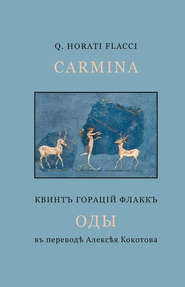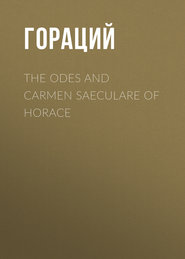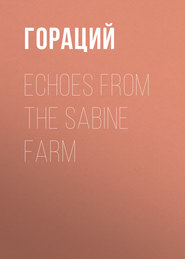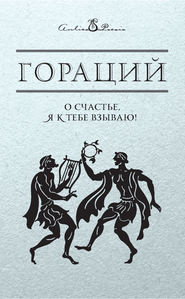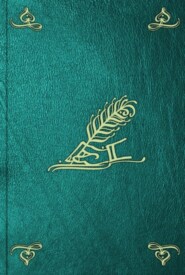По всем вопросам обращайтесь на: info@litportal.ru
(©) 2003-2024.
✖
The Works of Horace
Настройки чтения
Размер шрифта
Высота строк
Поля
Descend from heaven, queen Calliope, and come sing with your pipe a lengthened strain; or, if you had now rather, with your clear voice, or on the harp or lute of Phoebus. Do ye hear? or does a pleasing frenzy delude me? I seem to hear [her], and to wander [with her] along the hallowed groves, through which pleasant rivulets and gales make their way. Me, when a child, and fatigued with play, in sleep the woodland doves, famous in story, covered with green leaves in the Apulian Vultur, just without the limits of my native Apulia; so that it was matter of wonder to all that inhabit the nest of lofty Acherontia, the Bantine Forests, and the rich soil of low Ferentum, how I could sleep with my body safe from deadly vipers and ravenous bears; how I could be covered with sacred laurel and myrtle heaped together, though a child, not animated without the [inspiration of the] gods. Yours, O ye muses, I am yours, whether I am elevated to the Sabine heights; or whether the cool Praeneste, or the sloping Tibur, or the watery Baiae have delighted me. Me, who am attached to your fountains and dances, not the army put to flight at Philippi, not the execrable tree, nor a Palinurus in the Sicilian Sea has destroyed. While you shall be with me with pleasure will I, a sailor, dare the raging Bosphorus; or, a traveler, the burning sands of the Assyrian shore: I will visit the Britons inhuman to strangers, and the Concanian delighted [with drinking] the blood of horses; I will visit the quivered Geloni, and the Scythian river without hurt. You entertained lofty Caesar, seeking to put an end to his toils, in the Pierian grotto, as soon as he had distributed in towns his troops, wearied by campaigning: you administer [to him] moderate counsel, and graciously rejoice at it when administered. We are aware how he, who rules the inactive earth and the stormy main, the cities also, and the dreary realms [of hell], and alone governs with a righteous sway both gods and the human multitude, how he took off the impious Titans and the gigantic troop by his falling thunderbolts. That horrid youth, trusting to the strength of their arms, and the brethren proceeding to place Pelion upon shady Olympus, had brought great dread [even] upon Jove. But what could Typhoeus, and the strong Mimas, or what Porphyrion with his menacing statue; what Rhoetus, and Enceladus, a fierce darter with trees uptorn, avail, though rushing violently against the sounding shield of Pallas? At one part stood the eager Vulcan, at another the matron Juno, and he, who is never desirous to lay aside his bow from his shoulders, Apollo, the god of Delos and Patara, who bathes his flowing hair in the pure dew of Castalia, and possesses the groves of Lycia and his native wood. Force, void of conduct, falls by its own weight; moreover, the gods promote discreet force to further advantage; but the same beings detest forces, that meditate every kind of impiety. The hundred-handed Gyges is an evidence of the sentiments I allege: and Orion, the tempter of the spotless Diana, destroyed by a virgin dart. The earth, heaped over her own monsters, grieves and laments her offspring, sent to murky Hades by a thunderbolt; nor does the active fire consume Aetna that is placed over it, nor does the vulture desert the liver of incontinent Tityus, being stationed there as an avenger of his baseness; and three hundred chains confine the amorous Pirithous.
ODE V.
ON THE RECOVERY OF THE STANDARDS FROM PHRAATES.
We believe from his thundering that Jupiter has dominion in the heavens: Augustus shall be esteemed a present deity the Britons and terrible Parthians being added to the empire. What! has any soldier of Crassus lived, a degraded husband with a barbarian wife? And has (O [corrupted] senate, and degenerate morals!) the Marsian and Apulian, unmindful of the sacred bucklers, of the [Roman] name and gown, and of eternal Vesta, grown old in the lands of hostile fathers-in-law, Jupiter and the city being in safety? The prudent mind of Regulus had provided against this, dissenting from ignominious terms, and inferring from such a precedent destruction to the succeeding age, if the captive youth were not to perish unpitied. I have beheld, said he, the Roman standards affixed to the Carthaginian temples, and their arms taken away from our soldiers without bloodshed. I have beheld the arms of our citizens bound behind their free-born backs, and the gates [of the enemy] unshut, and the fields, which were depopulated by our battles, cultivated anew. The soldier, to be sure, ransomed by gold, will return a braver fellow!—No—you add loss to infamy; [for] neither does the wool once stained by the dye of the sea-weed ever resume its lost color; nor does genuine valor, when once it has failed, care to resume its place in those who have degenerated through cowardice. If the hind, disentangled from the thickset toils, ever fights, then indeed shall he be valorous, who has intrusted himself to faithless foes; and he shall trample upon the Carthaginians in a second war, who dastardly has felt the thongs with his arms tied behind him, and has been afraid of death. He, knowing no other way to preserve his life, has confounded peace with war. O scandal! O mighty Carthage, elevated to a higher pitch by Italy's disgraceful downfall! He (Regulus) is reported to have rejected the embrace of his virtuous wife and his little sons like one degraded; and to have sternly fixed his manly countenance on the ground, until, as an adviser, by his counsel he confirmed the wavering senators, and amid his weeping friends hastened away, a glorious exile. Notwithstanding he knew what the barbarian executioner was providing for him, yet he pushed from his opposing kindred and the populace retarding his return, in no other manner, than if (after he had quitted the tedious business of his clients, by determining their suit) he was only going to the Venafrian plains, or the Lacedaemonian Tarentum.
ODE VI.
TO THE ROMANS.
Thou shalt atone, O Roman, for the sins of your ancestors, though innocent, till you shall have repaired the temples and tottering shrines of the gods, and their statues, defiled with sooty smoke. Thou boldest sway, because thou bearest thyself subordinate to the gods; to this source refer every undertaking; to this, every event. The gods, because neglected, have inflicted many evils on calamitous Italy. Already has Monaeses, and the band of Pacorus, twice repelled our inauspicious attacks, and exults in having added the Roman spoils to their trivial collars. The Dacian and Ethiopian have almost demolished the city engaged in civil broils, the one formidable for his fleet, the other more expert for missile arrows. The times, fertile in wickedness, have in the first place polluted the marriage state, and [thence] the issue and families. From this fountain perdition being derived, has overwhelmed the nation and people. The marriageable virgin delights to be taught the Ionic dances, and even at this time is trained up in [seductive] arts, and cherishes unchaste desires from her very infancy. Soon after she courts younger debauchees when her husband is in his cups, nor has she any choice, to whom she shall privately grant her forbidden pleasures when the lights are removed, but at the word of command, openly, not without the knowledge of her husband, she will come forth, whether it be a factor that calls for her, or the captain of a Spanish ship, the extravagant purchaser of her disgrace. It was not a youth born from parents like these, that stained the sea with Carthaginian gore, and slew Pyrrhus, and mighty Antiochus, and terrific Annibal; but a manly progeny of rustic soldiers, instructed to turn the glebe with Sabine spades, and to carry clubs cut [out of the woods] at the pleasure of a rigid mother, what time the sun shifted the shadows of the mountains, and took the yokes from the wearied oxen, bringing on the pleasant hour with his retreating chariot. What does not wasting time destroy? The age of our fathers, worse than our grandsires, produced us still more flagitious, us, who are about to product am offspring more vicious [even than ourselves].
ODE VII.
TO ASTERIE.
Why, O Asterie, do you weep for Gyges, a youth of inviolable constancy, whom the kindly zephyrs will restore to you in the beginning of the Spring, enriched with a Bithynian cargo? Driven as far as Oricum by the southern winds, after [the rising] of the Goat's tempestuous constellation, he sleepless passes the cold nights in abundant weeping [for you]; but the agent of his anxious landlady slyly tempts him by a thousand methods, informing him that [his mistress], Chloe, is sighing for him, and burns with the same love that thou hast for him. He remonstrates with him how a perfidious woman urged the credulous Proetus, by false accusations, to hasten the death of the over-chaste Bellerophon. He tells how Peleus was like to have been given up to the infernal regions, while out of temperance he avoided the Magnesian Hippolyte: and the deceiver quotes histories to him, that are lessons for sinning. In vain; for, heart-whole as yet, he receives his words deafer than the Icarian rocks. But with regard to you, have a care lest your neighbor Enipeus prove too pleasing. Though no other person equally skillful to guide the steed, is conspicuous in the course, nor does any one with equal swiftness swim down the Etrurian stream, yet secure your house at the very approach of night, nor look down into the streets at the sound of the doleful pipe; and remain inflexible toward him, though he often upbraid thee with cruelty.
ODE VIII.
TO MAECENAS.
O Maecenas, learned in both languages, you wonder what I, a single man, have to do on the calends of March; what these flowers mean, and the censer replete with frankincense, and the coals laid upon the live turf. I made a vow of a joyous banquet, and a white goat to Bacchus, after having been at the point of death by a blow from a tree. This day, sacred in the revolving year, shall remove the cork fastened with pitch from that jar, which was set to inhale the smoke in the consulship of Tullus. Take, my Maecenas, a hundred cups on account of the safety of your friend, and continue the wakeful lamps even to day-light: all clamor and passion be far away. Postpone your political cares with regard to the state: the army of the Dacian Cotison is defeated; the troublesome Mede is quarreling with himself in a horrible [civil] war: the Cantabrian, our old enemy on the Spanish coast, is subject to us, though conquered by a long-disputed victory: now, too, the Scythians are preparing to quit the field with their imbent bows. Neglectful, as a private person, forbear to be too solicitous lest the community in any wise suffer, and joyfully seize the boons of the present hour, and quit serious affairs.
ODE IX.
TO LYDIA.
HORACE. As long as I was agreeable to thee, and no other youth more favored was wont to fold his arms around thy snowy neck, I lived happier than the Persian monarch.
LYDIA. As long as thou hadst not a greater flame for any other, nor was Lydia below Chloe [in thine affections], I Lydia, of distinguished fame, flourished more eminent than the Roman Ilia.
HOR. The Thracian Chloe now commands me, skillful in sweet modulations, and a mistress of the lyre; for whom I would not dread to die, if the fates would spare her, my surviving soul.
LYD. Calais, the son of the Thurian Ornitus, inflames me with a mutual fire; for whom I would twice endure to die, if the fates would spare my surviving youth.
HOR. What! if our former love returns, and unites by a brazen yoke us once parted? What if Chloe with her golden locks be shaken off, and the door again open to slighted Lydia.
LYD. Though he is fairer than a star, thou of more levity than a cork, and more passionate than the blustering Adriatic; with thee I should love to live, with thee I would cheerfully die.
ODE X.
TO LYCE.
O Lyce, had you drunk from the remote Tanais, in a state of marriage with tome barbarian, yet you might be sorry to expose me, prostrate before your obdurate doors, to the north winds that have made those places their abode. Do you hear with what a noise your gate, with what [a noise] the grove, planted about your elegant buildings, rebellows to the winds? And how Jupiter glazes the settled snow with his bright influence? Lay aside disdain, offensive to Venus, lest your rope should run backward, while the wheel is revolving. Your Tyrrhenian father did not beget you to be as inaccessible as Penelope to your wooers. O though neither presents, nor prayers, nor the violet-tinctured paleness of your lovers, nor your husband smitten with a musical courtezan, bend you to pity; yet [at length] spare your suppliants, you that are not softer than the sturdy oak, nor of a gentler disposition than the African serpents. This side [of mine] will not always be able to endure your threshold, and the rain.
ODE XI.
TO MERCURY.
O Mercury, for under thy instruction the ingenious Amphion moved rocks by his voice, you being his tutor; and though my harp, skilled in sounding, with seven strings, formerly neither vocal nor pleasing, but now agreeable both to the tables of the wealthy and the temples [of the gods]; dictate measures to which Lyde may incline her obstinate ears, who, like a filly of three years old, plays and frisks about in the spacious fields, inexperienced in nuptial loves, and hitherto unripe for a brisk husband. You are able to draw after your tigers and attendant woods, and to retard rapid rivers. To your blandishments the enormous porter of the [infernal] palace yielded, though a hundred serpents fortify his head, and a pestilential steam and an infectious poison issue from his triple-tongued mouth. Moreover, Ixion and Tityus smiled with a reluctant aspect: while you soothe the daughters of Danaus with your delightful harmony, their vessel for some time remained dry. Let Lyde hear of the crime, and the well-known punishment of the virgins, and the cask emptied by the water streaming through the bottom, and what lasting fates await their misdeeds even beyond the grave. Impious! (for what greater impiety could they have committed?) Impious! who could destroy their bridegrooms with the cruel sword! One out of the many, worthy of the nuptial torch, was nobly false to her perjured parent, and a maiden illustrious to all posterity; she, who said to her youthful husband, "Arise! arise! lest an eternal sleep be given to you from a hand you have no suspicion of; disappoint your father-in-law and my wicked sisters, who, like lionesses having possessed themselves of calves (alas)! tear each of them to pieces; I, of softer mold than they, will neither strike thee, nor detain thee in my custody. Let my father load me with cruel chains, because out of mercy I spared my unhappy spouse; let him transport me even to the extreme Numidian plains. Depart, whither your feet and the winds carry you, while the night and Venus are favorable: depart with happy omen; yet, not forgetful of me, engrave my mournful story on my tomb."
ODE XII.
TO NEOBULE.
It is for unhappy maidens neither to give indulgence to love, nor to wash away cares with delicious wine; or to be dispirited out of dread of the lashes of an uncle's tongue. The winged boy of Venus, O Neobule, has deprived you of your spindle and your webs, and the beauty of Hebrus from Lipara of inclination for the labors of industrious Minerva, after he has bathed his anointed shoulders in the waters of the Tiber; a better horseman than Bellerophon himself, neither conquered at boxing, nor by want of swiftness in the race: he is also skilled to strike with his javelin the stags, flying through the open plains in frightened herd, and active to surprise the wild boar lurking in the deep thicket.
ODE XIII. TO THE BANDUSIAN FOUNTAIN.
O thou fountain of Bandusia, clearer than glass, worthy of delicious wine, not unadorned by flowers; to-morrow thou shalt be presented with a kid, whose forehead, pouting with new horns, determines upon both love and war in vain; for this offspring of the wanton flock shall tinge thy cooling streams with scarlet blood. The severe season of the burning dog-star cannot reach thee; thou affordest a refreshing coolness to the oxen fatigued with the plough-share, and to the ranging flock. Thou also shalt become one of the famous fountains, through my celebrating the oak that covers the hollow rock, whence thy prattling rills descend with a bound.
ODE XIV.
TO THE ROMANS.
Augustus Caesar, O ye people, who was lately said, like another Hercules, to have sought for the laurel to be purchased only by death, revisits his domestic gods, victorious from the Spanish shore. Let the matron (Livia), to whom her husband alone is dear, come forth in public procession, having first performed her duty to the just gods; and (Octavia), the sister of our glorious general; the mothers also of the maidens and of the youths just preserved from danger, becomingly adorned with supplicatory fillets. Ye, O young men, and young women lately married, abstain from ill-omened words. This day, to me a real festival, shall expel gloomy cares: I will neither dread commotions, nor violent death, while Caesar is in possession of the earth. Go, slave, and seek for perfume and chaplets, and a cask that remembers the Marsian war, if any vessel could elude the vagabond Spartacus. And bid the tuneful Neaera make haste to collect into a knot her auburn hair; but if any delay should happen from the surly porter, come away. Hoary hair mollifies minds that are fond of strife and petulant wrangling. I would not have endured this treatment, warm with youth in the consulship of Plancus.
ODE XV.
TO CHLORIS.
You wife of the indigent Ibycus, at length put an end to your wickedness, and your infamous practices. Cease to sport among the damsels, and to diffuse a cloud among bright constellations, now on the verge of a timely death. If any thing will become Pholoe, it does not you Chloris, likewise. Your daughter with more propriety attacks the young men's apartments, like a Bacchanalian roused up by the rattling timbrel. The love of Nothus makes her frisk about like a wanton she-goat. The wool shorn near the famous Luceria becomes you now antiquated: not musical instruments, or the damask flower of the rose, or hogsheads drunk down to the lees.
ODE XVI.
TO MAECENAS.
A brazen tower, and doors of oak, and the melancholy watch of wakeful dogs, had sufficiently defended the imprisoned Danae from midnight gallants, had not Jupiter and Venus laughed at Acrisius, the anxious keeper of the immured maiden: [for they well knew] that the way would be safe and open, after the god had transformed himself into a bribe. Gold delights to penetrate through the midst of guards, and to break through stone-walls, more potent than the thunderbolt. The family of the Grecian augur perished, immersed in destruction on account of lucre. The man of Macedon cleft the gates of the cities and subverted rival monarchs by bribery. Bribes enthrall fierce captains of ships. Care, and a thirst for greater things, is the consequence of increasing wealth. Therefore, Maecenas, thou glory of the [Roman] knights, I have justly dreaded to raise the far-conspicuous head. As much more as any man shall deny himself, so much more shall he receive from the gods. Naked as I am, I seek the camps of those who covet nothing; and as a deserter, rejoice to quit the side of the wealthy: a more illustrious possessor of a contemptible fortune, than if I could be said to treasure up in my granaries all that the industrious Apulian cultivates, poor amid abundance of wealth. A rivulet of clear water, and a wood of a few acres, and a certain prospect of my good crop, are blessings unknown to him who glitters in the proconsulship of fertile Africa: I am more happily circumstanced. Though neither the Calabrian bees produce honey, nor wine ripens to age for me in a Formian cask, nor rich fleeces increase in Gallic pastures; yet distressful poverty is remote; nor, if I desired more, would you refuse to grant it me. I shall be better able to extend my small revenues, by contracting my desires, than if I could join the kingdom of Alyattes to the Phrygian plains. Much is wanting to those who covet much. 'Tis well with him to whom God has given what is necessary with a sparing hand.
ODE XVII.
TO AELIUS LAMIA.
O Aelius, who art nobly descended from the ancient Lamus (forasmuch as they report, that both the first of the Lamian family had their name hence, and all the race of the descendants through faithful records derives its origin from that founder, who is said to have possessed, as prince, the Formian walls, and Liris gliding on the shores of Marica—an extensive potentate). To-morrow a tempest sent from the east shall strew the grove with many leaves, and the shore with useless sea-weed, unless that old prophetess of rain, the raven, deceives me. Pile up the dry wood, while you may; to-morrow you shall indulge your genius with wine, and with a pig of two months old, with your slaves dismissed from their labors.
ODE XVIII.
TO FAUNUS.
A HYMN.
O Faunus, thou lover of the flying nymphs, benignly traverse my borders and sunny fields, and depart propitious to the young offspring of my flocks; if a tender kid fall [a victim] to thee at the completion of the year, and plenty of wines be not wanting to the goblet, the companion of Venus, and the ancient altar smoke with liberal perfume. All the cattle sport in the grassy plain, when the nones of December return to thee; the village keeping holiday enjoys leisure in the fields, together with the oxen free from toil. The wolf wanders among the fearless lambs; the wood scatters its rural leaves for thee, and the laborer rejoices to have beaten the hated ground in triple dance.
ODE XIX.
TO TELEPHUS.
Другие электронные книги автора Квинт Гораций Флакк
Другие аудиокниги автора Квинт Гораций Флакк
Избранные оды




 4.67
4.67






